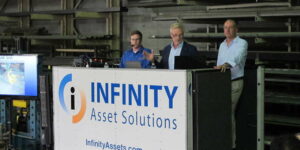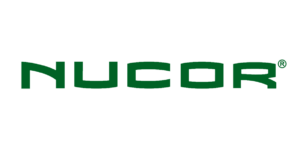Seeing Saw Advantages
By utilizing an advanced design of billet-cutting saw from Advanced Machine & Engineering, Clifford-Jacobs Forging Company realized faster throughput on its billet blank preparation, with a high degree of accuracy and an anticipated 20-year service life – all without major rebuilding.
Posted: October 29, 2013
Clifford-Jacobs Forging Company (Champaign, IL) has become a major Midwest supplier to aerospace, off-road construction, mining, forestry, truck, military, rail transit and the oil/gas equipment markets worldwide since its founding in 1919 by Cass Clifford and David Jacobs.
The origins of the company include a great story of tenacity and determination to succeed. Following a fire that nearly destroyed the business and the onset of the Great Depression, Jacobs and the company’s one employee cut, forged and trimmed an order of 300 service hubs for Chevrolet . . . at fifty cents apiece. To save additional shipping cost, the men loaded the product into wheelbarrows and hauled them to the local rail station in Champaign.
Today, the company’s Total Quality program mandates continuous improvement in management tasking, production reporting, and especially equipment upgrades to maintain the highest level of quality and consistency possible.
While the shop centers on the forging process with 1,500-25,000 lb steam hammers, the billet blanking saw department is where the process begins. Here, one of the original billet-cutting saws – the sixth one ever built by a man named Willy Goellner in 1971 and still functioning today – cuts billets up to 12 in diameter to prepare the blanks for the forging process.
An AMSAW S300R, a 34 in circular carbide saw with a material handler, cuts an 8.25 in diameter bar of steel and dispenses the cut piece in 25 seconds at 83dB.
Goellner designed and built these saws at his own company, Advanced Engineering. Now renamed Advanced Machine & Engineering Co. (AME; Rockford, IL), he remains chairman and runs the business along with his sons. He has since designed a new generation of saw called Amsaw® for today’s cutting needs, based on state-of-the-art machine technology.
AME still supplies Clifford-Jacobs its billet-cutting saws and has recently installed one of its latest developments, the AMSAW S300, for use on 3 in to 12 in billets, though the customer here primarily uses it for 6 in to 9 in stock, according to Mike Snell, the engineering and operations manager and a 27-year employee at Clifford-Jacobs.
“We process a very wide variety of materials here in this shop and we use the AMSAW for all but some aerospace and stainless grades. That covers carbon, alloy and bearing steels, calcium-treated, VIM-VAR and customer-supplied proprietary grades from such leading companies as Caterpillar, Westinghouse, GE and Boeing Aerospace,” says Snell.
In the sawing department, Snell explains how long bar stock is offloaded by overhead crane and fed directly onto the saw tables. On the AMSAW S300, a PLC maintains the precise feed settings and monitors the loading system. According to AME, this particular style of carbide billet-cutting saw outperforms a band saw by a factor of eight, at less cost per square inch of material cut.
Snell notes that, while his shop has not studied that particular comparative aspect of the saw’s performance, he is certain the AMSAW makes a discernable difference in the overall output of the sawing department at his company.
The same grind is used on all saw blades and though the shop uses a local source for resharpening and new blades, all machine service and the rebuild/upgrading work on the AME saws is purchased through the manufacturer as part of a scheduled predictive maintenance procedure in place at Clifford-Jacobs.
“Steve Swanson, our contact at AME, has been with Willy (Goellner) at the company from almost since the beginning,” smiles Snell. “We can call on him and know our work is being handled by someone who is familiar with us, our needs and the particulars of our process.”
Beyond this personal closeness in the working relationship, the performance of the AMSAW is what appeals most to Snell, who says the machine can hold ±0.010 in or better tolerances routinely on the material blanks, including the hardest materials processed in the shop. He credits the design of the AMSAW machine that uses pivot point rather than older way technologies to maintain this consistent cutting action.
The AMSAW S300 used by Clifford-Jacobs was one of the first such machines installed and Snell admits there were some difficulties at the outset. “The initial problems took awhile to solve, but AME and our shop stuck with it and, in the end, we got exactly what we wanted from the machine,” he recalls. “That’s a credit to both companies, but when you’ve relied on a supplier for so long, it’s worth having them as a cooperative partner. We’d like to think our customers have the same attitude towards us.”
Snell points out that the smaller saws in the department have been rebuilt approximately every eight years. He predicts the AMSAW S300 might go 20 years before requiring a rebuild. “We use the machines constantly about 50 hours each week, with only a routine maintenance shutdown every July,” he says.
Snell added that the training received from AME for his three operators in the sawing department was thorough and allowed nearly immediate production to launch.
Editor’s note: Amsaw® is a registered trademark of Advanced Machine & Engineering Co.
Mike Snell is the engineering and operations manager at Clifford-Jacobs Forging Company, PO Box 830, Champaign, IL 61824-8320, 217-352-5172, Fax: 217-352-4629, sales@clifford-jacobs.com, www.clifford-jacobs.com.
Steve Swanson is a product manager for Advanced Machine & Engineering Co., 2500 Latham Street, Rockford, IL 61103, 815-962-6076, Fax: 815-963-4703, info@ame.com, www.ame.com.
















